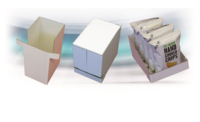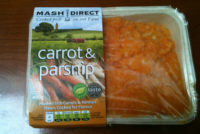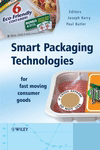Making a case for retail-ready packaging
A roundtable discussion on the challenges and opportunities
in today’s case forming, packing and sealing machinery.
 To view this article in the digital edition,
click here
and turn to page 24.
To view this article in the digital edition,
click here
and turn to page 24.
Contributors:
Bryan Sinicrope, VP Sales and Marketing, A-B-C Packaging Machine Corp. (www.abcpackaging.com)
Jackie Deitz, Marketing Coordinator, Delkor Systems (www.delkorsystems.com)
Chris Calabrese, Sales Manager, Fallas Automation (www.fallasautomation.com)
FBP: What challenges do retail-ready packs (RRP) present to case packers and how are today’s systems accommodating those needs?
Calabrese: The biggest challenge now is that most companies don’t know what configuration they will need for the marketing group. Fallas Automation provides two different vertical style case packers for retail-ready packaging machines that provide a different pack pattern. The requirements of the machines nowadays dictate that they must pack the RRP as well as regular lay-flat-style conventional shippers. One machine is better suited for packing the RRP with the facing of the bags along the length of the case, while the other machine is better suited for packing the straight stack of one row and the facing is on the width of the case. There are dimensional and speed limitations on both. Choosing the correct machine is very dependent on the final decided pack pattern.
Deitz: RRP present case packers with the problem of creating a package ready for retail shelves that also provides adequate protection to the product during shipping and handling. RRP require a secondary packaging style that involves minimal adjustments to the package when transferring product from pallet to shelf. To meet retailer’s retail-ready needs, case packers are creating trays, cases/cartons with tear strips, and preprint shrink packaging for presenting multi-pack product on shelves. Delkor Systems, offers a variety of shelf-ready packaging solutions ranging from shrink wrapped bundles to trays displaying large beverage bottles with or without handles, all of which provide sufficient product protection during shipping.
Sinicrope: A-B-C’s modular case and tray packers provide the flexibility to erect, pack and seal a variety of case and tray styles and onto pads for shrink-wrapped packaging, which gives manufacturers a standard solution that is generally most cost-effective. That said, RRP can present challenges as the case and tray designs may be more complex, and if there is a lid system, it is usually formed separately. We would recommend that manufacturers consult with their packaging machinery suppliers during the design phase, as machinery builders can often help with solutions that allow them to purchase an “off the shelf” machine modified to meet their needs.
FBP: How has the sustainability (‘green’) movement affected case forming/packing/sealing?
Calabrese: We have made our equipment accommodate the weaker (recycled content) shipping cases. As far as the equipment goes, we are always striving to use more energy-efficient motors drives, etc. We also maintain a green initiative within our factory.
Deitz: The “green” movement has pushed packagers to explore methods of making packaging more sustainable. Sustainability means minimizing negative impacts the packaging materials or processes may have on the environment while sufficiently protecting products during shipping and handling. Many companies work towards sustainability by reducing the materials used in secondary packaging, which decreases the waste footprint on the environment. Our Spot-Pak® Packaging System is an example of this method. Product is temporarily bonded to a flat corrugate pad and shrink-wrapped instead of being packed into a traditional corrugate case. This package provides the protection of an RSC case, but reduces material waste by up to 75%.
Sinicrope: Sustainability is top of mind for most manufacturers, and we are helping our customers to reduce their carbon footprint with machines that have high efficiency motors and seal with renewable soy-based “cool” adhesives allowing them to reduce their energy and material consumption. We offer solutions that can reduce corrugated consumption and palletizing alternatives to shrink wrap. Plastic shrink wrap packaging for display trays and pallet protection has come under fire because it is petroleum-based and in many areas it cannot be recycled.
‘Green’ packaging calls for gentler handling
With the increase of “green” packages comes the challenge of handling new types of packages, which can sometimes be delicate. Fragile containers often used with sustainable packages sometimes need gentler handling, and in response to that need, Standard-Knapp (www.standard-knapp.com) has introduced its 939S Versatron with a new lowering head module that’s gentler than drop packing.
The 939S Versatron Soft Catch Servo Case Packer minimizes the amount of material needed for container partitions, and major national retail chains have achieved savings as high as 10% in the cost of a case. The lowering head module can pick up bottles and other containers and carry them to the packing area, where they can be packed in the case without dropping. The machine places the container all the way to the bottom of the case, at 30 cycles per minute, the fastest rate among lowering head machines. The 939S Versatron has technology that enables packers to handle the thinner, lightweight, and more fragile glass containers being used in the move towards greener, more sustainable packaging.

Contributors:
Bryan Sinicrope, VP Sales and Marketing, A-B-C Packaging Machine Corp. (www.abcpackaging.com)
Jackie Deitz, Marketing Coordinator, Delkor Systems (www.delkorsystems.com)
Chris Calabrese, Sales Manager, Fallas Automation (www.fallasautomation.com)
FBP: What challenges do retail-ready packs (RRP) present to case packers and how are today’s systems accommodating those needs?
Calabrese: The biggest challenge now is that most companies don’t know what configuration they will need for the marketing group. Fallas Automation provides two different vertical style case packers for retail-ready packaging machines that provide a different pack pattern. The requirements of the machines nowadays dictate that they must pack the RRP as well as regular lay-flat-style conventional shippers. One machine is better suited for packing the RRP with the facing of the bags along the length of the case, while the other machine is better suited for packing the straight stack of one row and the facing is on the width of the case. There are dimensional and speed limitations on both. Choosing the correct machine is very dependent on the final decided pack pattern.
Deitz: RRP present case packers with the problem of creating a package ready for retail shelves that also provides adequate protection to the product during shipping and handling. RRP require a secondary packaging style that involves minimal adjustments to the package when transferring product from pallet to shelf. To meet retailer’s retail-ready needs, case packers are creating trays, cases/cartons with tear strips, and preprint shrink packaging for presenting multi-pack product on shelves. Delkor Systems, offers a variety of shelf-ready packaging solutions ranging from shrink wrapped bundles to trays displaying large beverage bottles with or without handles, all of which provide sufficient product protection during shipping.
Sinicrope: A-B-C’s modular case and tray packers provide the flexibility to erect, pack and seal a variety of case and tray styles and onto pads for shrink-wrapped packaging, which gives manufacturers a standard solution that is generally most cost-effective. That said, RRP can present challenges as the case and tray designs may be more complex, and if there is a lid system, it is usually formed separately. We would recommend that manufacturers consult with their packaging machinery suppliers during the design phase, as machinery builders can often help with solutions that allow them to purchase an “off the shelf” machine modified to meet their needs.
FBP: How has the sustainability (‘green’) movement affected case forming/packing/sealing?
Calabrese: We have made our equipment accommodate the weaker (recycled content) shipping cases. As far as the equipment goes, we are always striving to use more energy-efficient motors drives, etc. We also maintain a green initiative within our factory.
Deitz: The “green” movement has pushed packagers to explore methods of making packaging more sustainable. Sustainability means minimizing negative impacts the packaging materials or processes may have on the environment while sufficiently protecting products during shipping and handling. Many companies work towards sustainability by reducing the materials used in secondary packaging, which decreases the waste footprint on the environment. Our Spot-Pak® Packaging System is an example of this method. Product is temporarily bonded to a flat corrugate pad and shrink-wrapped instead of being packed into a traditional corrugate case. This package provides the protection of an RSC case, but reduces material waste by up to 75%.
Sinicrope: Sustainability is top of mind for most manufacturers, and we are helping our customers to reduce their carbon footprint with machines that have high efficiency motors and seal with renewable soy-based “cool” adhesives allowing them to reduce their energy and material consumption. We offer solutions that can reduce corrugated consumption and palletizing alternatives to shrink wrap. Plastic shrink wrap packaging for display trays and pallet protection has come under fire because it is petroleum-based and in many areas it cannot be recycled.
‘Green’ packaging calls for gentler handling
With the increase of “green” packages comes the challenge of handling new types of packages, which can sometimes be delicate. Fragile containers often used with sustainable packages sometimes need gentler handling, and in response to that need, Standard-Knapp (www.standard-knapp.com) has introduced its 939S Versatron with a new lowering head module that’s gentler than drop packing.
The 939S Versatron Soft Catch Servo Case Packer minimizes the amount of material needed for container partitions, and major national retail chains have achieved savings as high as 10% in the cost of a case. The lowering head module can pick up bottles and other containers and carry them to the packing area, where they can be packed in the case without dropping. The machine places the container all the way to the bottom of the case, at 30 cycles per minute, the fastest rate among lowering head machines. The 939S Versatron has technology that enables packers to handle the thinner, lightweight, and more fragile glass containers being used in the move towards greener, more sustainable packaging.
Looking for a reprint of this article?
From high-res PDFs to custom plaques, order your copy today!











